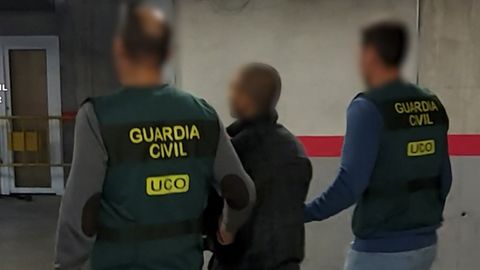
Author:
Androgen receptor modulators are offered as an alternative to steroids
They are called selective androgen receptor modulators (SARMs) and are advertised as an alternative to steroids, but their distribution and sale is not allowed in Spain. The criminal organization offered them to athletes through social networks and a website, until the Civil Guard did not break it up.
After two years of investigation, the Department of Public Health and Doping of the Central Operational Unit (UCO) of the Civil Guard, in cooperation with the armed institute in Catalonia, managed to expose the first criminal network in Spain dedicated to the import, production and distribution of these drugs.
This operation, called Sahagún-Arán and carried out in Barcelona, Valencia, Malaga, Madrid, Granada, Murcia and Las Palmas de Gran Canaria, was reported on Wednesday by the Civil Guard, which emphasized in a statement that this investigation Prohibited substances and auxiliary material for their conditioning with a value of more than 870,000 euros were confiscated.
And he adds that buyers and/or consumers of these substances are connected to the world of sports and physio-bodybuilding.
According to the Civil Guard, this is the first time that an operation related to the trafficking of this type of substance has been carried out on Spanish territory.
Because SARMs are cataloged by the Spanish Medicines Agency as “drugs in experiments”, therefore its distribution and sale is not allowed in Spain.
They are advertised as a side-effect-free and oral alternative to steroids, but researchers stress that their use can lead to “significant side effects”, such as high blood pressure, skin rashes, headaches, liver poisoning, vision problems or impotence.
They offered drugs through social networks and websites with the promise that their consumption would result in improved sports results.
mode of operation
The organization imported powdered active ingredients from third countries to then prepare the drugs and distribute them in a liquid state inside a dropper container.
To do this, they cooperated with an official laboratory that treated drugs from third countries to mix them with the necessary excipients for their consumption.
In addition, the laboratory was in charge of conditioning the drugs, packing them into dropper bottles and inserting them into individual boxes.
After the drug droppers were prepared, they were sent to logistics companies that were in charge of their final conditioning and shipping to of different receivers, which are located on the peninsula, on the Canary Islands and in some countries of the European Union.
The sale of these products took place through an internet domain where the various types of SARMs that the organization had for sale were offered.
It was also possible to find links to the profiles of various social networks, which are mainly related to personal trainers and physio-bodybuilders, who actively promoted the use of these substances to improve physical and athletic abilities.
The agents did four searches at addresses in Premiá de Mar (Barcelona), Valencia, Torremolinos (Málaga) and Madrid, with three more carried out at two logistics companies in the provinces of Barcelona and Las Palmas de Gran Canaria and at a laboratory in the province of Granada.
In addition to these operations, the preparation and packaging machines that the organization intended to put into operation as an industrial mixing and filling chain in the near future were also sealed.
Three were arrested, and six are under investigation
The investigations led to the arrest of three people – two men and one woman – of Spanish nationality, and the investigation of six others.
In addition, around 10,000 droppers of 10 different types of SARM, fully prepared and packaged for distribution, 3,200 grams of this powder drug and 870 liters of PEG-400 excipient were seized.
About 15,000 empty containers prepared for SARM, droppers, labels, packaging boxes and two pieces of industrial machinery also intervened to mix the powdered substances with excipients, fill the containers and label them. All this estimated at around 870,000 euros.
The operation was managed by Court No. 1 in Mataró (Barcelona) in collaboration with the National Agency of the Spanish Anti-Doping Commission in Sports, the Pharmaceutical Inspectorate of Catalonia and Andalusia, the Catholic University of Murcia and the University of San Pablo CEU, which provided “vital technical advice helping in the records and conducted inspections,” the Civil Guard points out.
Source: La Vozde Galicia
I’m Emma Jack, a news website author at 24 News Reporters. I have been in the industry for over five years and it has been an incredible journey so far. I specialize in sports reporting and am highly knowledgeable about the latest trends and developments in this field.







